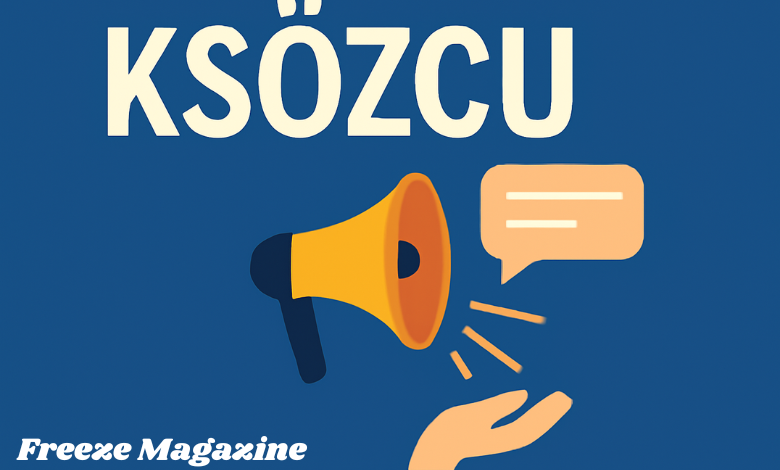Ksözcü: The Evolving Role of Spokespersons in Journalism and Media
Introduction
The term ksözcü may not be universally familiar to those outside of Turkish linguistic and cultural circles, but its significance is deeply embedded in the broader concepts of communication, media, and societal engagement. Rooted in the Turkish word sözcü, meaning speaker or voice, ksözcü essentially refers to someone who represents others, delivering messages and communicating essential information. The role is one that has evolved significantly, especially in modern contexts, where it is often associated with media, journalism, and even the public relations sector.
What Does “Ksözcü” Mean?
At its core, ksözcü can be understood as a representative, spokesperson, or messenger. It’s a term that speaks to the act of transmitting information between different parties, often in a way that simplifies complex messages for the public or a specific audience. The word itself derives from sözcü, which refers to a person who speaks, conveys ideas, or acts as the voice of a group or institution. Historically, the role of a ksözcü could have been filled by individuals tasked with delivering decrees, news, or announcements on behalf of those in positions of power, such as monarchs, governments, or other authoritative bodies. Their primary function was to be a conduit of communication, ensuring that the messages were clear, understood, and made accessible to the intended recipients.
The Evolution of the Role of Ksözcü
Over time, the role of the ksözcü has expanded far beyond its original connotations. In modern-day Turkey, the term is commonly associated with journalists and media professionals who act as the primary channels of information between institutions and the public. In many ways, today’s ksözcü embodies the essence of journalism itself—acting as the bridge between events, individuals, and the public’s understanding of those events.
With the rise of digital media, the scope of the ksözcü has become even more expansive. The role is not confined to those working in traditional media outlets such as television or newspapers. Now, bloggers, social media influencers, and other online content creators can also be seen as modern-day ksözcüs, as they take on the responsibility of presenting news, opinions, and information to a broad audience. In this context, they must also maintain a level of trust with their audiences, ensuring that the information shared is accurate, fair, and responsible.
The Responsibilities of a Ksözcü
Whether in traditional or modern settings, the responsibilities of a ksözcü have always revolved around conveying information effectively. In the past, this meant being a reliable messenger for rulers or institutions. Today, it extends to journalists who must deliver news with integrity, as well as individuals who shape public discourse through various forms of media.
One of the most important roles of a ksözcü is to serve as a gatekeeper of information. In a world saturated with information—much of it unverified or misleading—the ksözcü must exercise discernment, choosing what is relevant and ensuring that it is communicated with clarity. The task is not just to deliver news but to frame it in a way that is understandable to the audience. This requires a deep understanding of the issues being discussed, an awareness of the broader social and political context, and the ability to communicate complex ideas succinctly.
Another vital responsibility is that of being a voice for the public. A ksözcü does not simply represent an institution or individual; they also serve as an intermediary for the people. Their role is to ensure that the public’s concerns are heard and addressed, whether they are acting as a journalist uncovering societal issues or as a spokesperson for a government body providing updates on policy or crisis response.
In a democratic society, the ksözcü holds the critical responsibility of ensuring transparency and accountability. Journalists, for instance, hold power to account by reporting on the actions of governments, businesses, and other influential entities. This accountability is fundamental to the functioning of a free society, where the flow of information must remain open and unfettered to allow the public to make informed decisions.
Ksözcü and Journalism
In contemporary times, ksözcü has become nearly synonymous with the role of a journalist. Journalists are tasked with delivering accurate, unbiased, and timely information to the public. They bridge the gap between complex events and the general populace, ensuring that people understand the significance of what is happening in the world around them. This journalistic function is increasingly important in an era where media outlets are often seen as the gatekeepers of truth. In this sense, the ksözcü is not merely a messenger but a crucial figure in maintaining the integrity of the information ecosystem. By investigating stories, questioning power structures, and uncovering hidden truths, journalists act as a safeguard against misinformation and ensure that the public is informed about critical issues.
However, with the rise of digital platforms, the boundaries of journalism and the role of the ksözcü have blurred. Traditional journalism now competes with social media influencers, citizen journalists, and other informal sources of information. While this democratization of information can lead to a more inclusive public discourse, it also raises concerns about the accuracy and reliability of the messages being communicated. In this rapidly evolving landscape, the ksözcü—whether traditional or modern—must maintain a commitment to truth, ethical standards, and objectivity.
Ksözcü in Politics and Public Relations
While the role of the ksözcü is often associated with journalism, it is also critical in other fields, such as politics and public relations. Politicians frequently rely on spokespersons to communicate their policies, decisions, and positions to the public. These spokespersons, often referred to as ksözcüs in Turkey, are responsible for crafting messages that are not only clear but also persuasive, ensuring that the intended narrative is received in the best possible light.
In political contexts, the role of the ksözcü can take on an even more strategic dimension. A political ksözcü may be tasked with shaping public perception, responding to criticism, and deflecting negative attention. They must be skilled in the art of diplomacy, balancing the need for transparency with the goal of protecting the interests of their principal. Often, the success of a political figure’s message—and, by extension, their public image—depends heavily on the effectiveness of their ksözcü.
In the realm of public relations, the ksözcü plays a similar role. Companies and organizations use spokespeople to communicate their brand messages, respond to crises, and engage with the public. In these cases, the ksözcü is not just delivering information but also managing the brand’s reputation and fostering trust with its audience. Much like a journalist, a public relations ksözcü must carefully navigate the complexities of messaging, ensuring that the information shared aligns with both the organization’s values and the public’s expectations.
The Modern Challenges Facing Ksözcüs
In today’s world, the role of the ksözcü faces several challenges. Perhaps the most significant of these is the rise of misinformation and disinformation. In an era where anyone with a social media account can share their views and opinions with a global audience, the need for trusted messengers has never been greater. Fake news, conspiracy theories, and the spread of false information can quickly undermine public trust in the media and other institutions. As a result, the responsibility of the ksözcü to verify information and present it accurately has become a paramount concern.
Another challenge is the increasing commercialization of media. In many cases, news organizations are under pressure to prioritize entertainment and sensationalism over fact-based reporting. This trend has led to a decline in journalistic standards in some areas, with some ksözcüs being more focused on gaining attention or driving traffic rather than providing in-depth, responsible reporting. This shift in priorities can erode the public’s trust in the role of the ksözcü as a neutral and objective source of information.
Finally, the rapid pace of digital media has created an environment in which the public is constantly bombarded with information. With the sheer volume of news and content available at all times, the role of the ksözcü becomes even more complex. How does one distill important messages from a flood of noise? How does one ensure that the public receives the right information amidst a constant barrage of opinions and commentary? These are questions that modern-day ksözcüs must contend with as they navigate the evolving landscape of media and communication.
Conclusion
The concept of the ksözcü—a spokesperson or representative—has evolved significantly over time. While its roots lie in traditional forms of communication, the modern ksözcü plays a crucial role in journalism, politics, public relations, and beyond. As the gatekeeper of information, the ksözcü must navigate complex landscapes, balancing transparency, integrity, and accountability. In an era of misinformation and fragmented media, the role of the ksözcü is more important than ever. The responsibility of connecting the public to truth, whether through news reporting or the delivery of institutional messages, requires a commitment to ethics and a clear understanding of the power of words. As the media landscape continues to shift, the ksözcü must adapt, ensuring that their role as a reliable messenger remains central to the functioning of a democratic society.
FAQS
1. What is the meaning of ksözcü?
Ksözcü refers to a spokesperson or representative, someone who communicates and delivers information between institutions and the public.
2. How is ksözcü related to journalism?
In modern times, a ksözcü often acts as a journalist, delivering news and bridging gaps between events and the public.
3. Is a ksözcü always a journalist?
No, while often associated with journalism, a ksözcü can also be a spokesperson in politics or public relations.
4. What role does a ksözcü play in politics?
A ksözcü in politics is responsible for communicating a politician’s messages, policies, and responses to the public.
5. How has the role of ksözcü evolved over time?
The role of ksözcü has expanded, now including journalists, public relations professionals, and social media influencers, adapting to modern media.








Post Comment